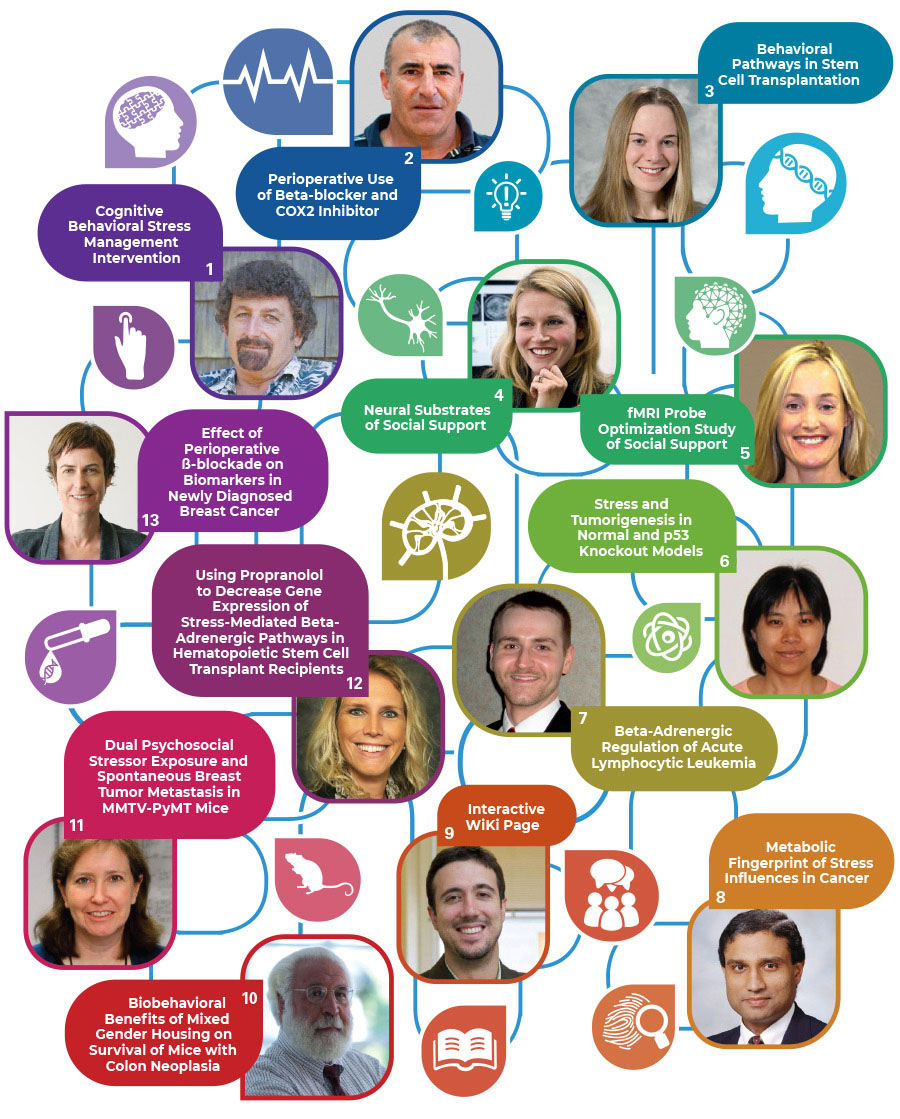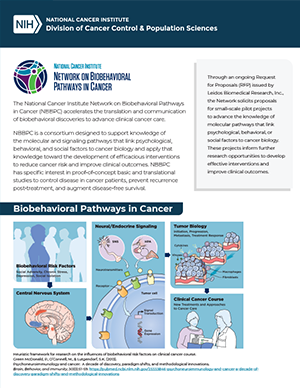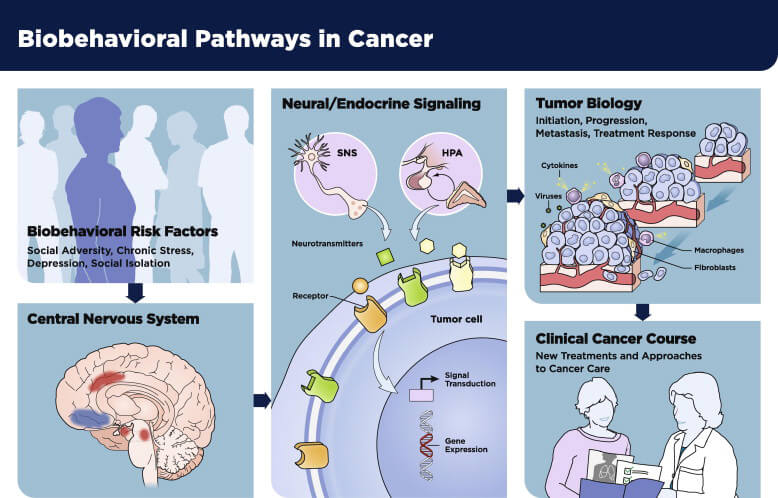These projects have been funded in whole or in part with federal funds from the National Cancer Institute, National Institutes of Health, under Contract No. HHSN261200800001E. This research was supported by the National Cancer Institute Network on Biobehavioral Pathways in Cancer.

The National Cancer Institute Network on Biobehavioral Pathways in Cancer (NBBPC) accelerates the translation and communication of biobehavioral discoveries to advance clinical cancer care.
NBBPC is a consortium designed to support knowledge of the molecular and signaling pathways that link psychological, behavioral, and social factors to cancer biology and apply that knowledge toward the development of efficacious interventions to reduce cancer risk and improve clinical outcomes. NBBPC has specific interest in proof-of-concept basic and translational studies to control disease in cancer patients, prevent recurrence post-treatment, and augment disease-free survival.
Capstone Meeting – September 16, 2016
Five years ago, a handful of cancer researchers with training in cell biology, psychology, public health, and related fields, set out to study the pathways that link psychological, behavioral, and social factors to cancer. Of particular interest, was whether stress and other psychological phenomena caused tumors to grow larger – and whether behaviors such as exercise or social engagement improved outcomes. The National Cancer Institute (NCI) Basic Biobehavioral and Psychological Sciences Branch led the effort to explore how psychological phenomena might be affecting the biology of cancer and disease outcomes via the Network on Biobehavioral Pathways in Cancer. On September 16, Network-funded researchers gathered at NCI-Shady Grove to deliver their findings.
Mission
The Network fosters research excellence through the integration and dissemination of relevant scientific discoveries and the identification, support, and communication of new research directions in the field of biobehavioral pathways in cancer.
Priorities
- Stimulate novel scientific concepts and paradigms
- Foster innovative collaborations across a variety of disciplines
- Disseminate relevant discoveries through major scientific conferences and meetings
- Accelerate the translation of discoveries to patient benefit
- Synthesize the state of the science, analyze secondary data, and publish
- Encourage established scientists to apply their expertise to this emerging area of research
- Cultivate the education, training, and professional advancement of early career scientists
Members
NBBPC members provide the following:
- Foster the discovery-to-translation continuum of research related to biobehavioral pathways in cancer;
- Focus on unmet, understudied, highly exploratory questions that can’t yet be addressed through the submission of a research project grant application to NCI; and
- Develop and conduct proof of concept/principal/feasibility studies in support of the near term submission of research project grant applications to NCI.
The Network leverages and integrates expertise in cancer, stress, and cell biology; neuroscience; health behavior; psychology; social science; and oncology to advance the understanding of biological pathways that link behavioral processes and cancer.
The Network supports research in brain pathways that underlie psychological and social experiences, and their neurobiological impact on cancer via the sympathetic nervous system.
Scientific Steering Committee

Linda Alexander, Ph.D. ![]()
Associate Dean for Academic Affairs
Professor, Social and Behavioral Sciences
West Virginia University

Steve Cole, Ph.D. ![]()
Associate Professor
David Geffen School of Medicine
University of California, Los Angeles

Susan K. Lutgendorf, Ph.D. ![]()
Professor & Starch Faculty Fellow
Department of Psychology
University of Iowa

Anil K. Sood, MD ![]()
Director, Professor
Dept. of Gynecologic Oncology and Cancer Biology
M.D. Anderson Cancer Center
Current Members
Shamgar Ben-Eliyahu, Ph.D.
Nathan A. Berger, MD
Julienne Bower, Ph.D.
Erin Costanzo, Ph.D.
Naomi Eisenberger, Ph.D.
Jennifer M. Knight, MD
Don Lamkin, Ph.D.
Kelley S. Madden, Ph.D.
Erica Sloan, Ph.D.
Tor Wager, Ph.D.
Resources
-
“How the body’s nerves become accomplices in the spread of cancer”.
 Science Magazine article. September 12, 2019.
Science Magazine article. September 12, 2019. -
Leschak CJ, Dutcher JM, Haltom KEB, Breen EC, Bower JE, Eisenberger NI. Associations between amygdala reactivity to social threat, perceived stress and C-reactive protein in breast cancer survivors. Soc Cogn Affect Neurosci. 2020;15(10):1056-1063. doi: 1093/scan/nsz103
 .
.
Heuristic framework for research on biobehavioral risk factor influences on clinical cancer course.
Green, P., O’Connell, M., & Lutgendorf, S.K. (2013). Psychoneuroimmunology and cancer: A decade of discovery, paradigm shifts, and methodological innovations. Brain, Behavior, and Immunity, 30, S1-S9.
Download as PPT Download as PDFPilot Project Descriptions

Effects of Cognitive Behavioral Stress Management Intervention on Clinical Disease Endpoints in Women with Breast Cancer
Michael H. Antoni, Ph.D., University of Miami ![]()
This project consists of extensive follow-up of a randomized, controlled trial, which aims to test the effects of group-based cognitive behavioral stress management intervention versus psychoeducational control on clinical disease endpoints over an extended time in women initially treated for non-metastatic breast cancer. It examines whether specific biobehavioral and psychological adaptation processes modified by the intervention in the first year of medical treatment predict differences in clinical endpoints (e.g., survival and recurrence) up to 13 years later.
Cognitive Behavioral Stress Management Intervention (University of Miami)
Stagl, J.M., Lechner, S.C., Carver, C.S., Bouchard, L.C., Gudenkauf, L.M., Jutagir, D.R., Diaz, A., Yu, Q., Blomberg, B.B., Ironson, G., Glück, S., Antoni, M.H. A randomized controlled trial of cognitive-behavioral stress management in breast cancer: survival and recurrence at 11-year follow-up. Breast Cancer Res Treat. 2015. Nov; 154(2):319-28.
Perioperative Use of Beta-blocker and COX2 Inhibitor
Shamgar Ben-Eliyahu, Ph.D., Tel Aviv University ![]()
This project uses multicenter randomization to assess the short-term effects of counteracting excess perioperative catecholamine and prostaglandin levels on immune, endocrine, and pro-metastatic serum and histological indices. Results of this project will be used to develop a large-scale clinical trial.
Behavioral Pathways in Stem Cell Transplantation: CD14+ Gene Expression
Erin Costanzo, Ph.D., University of Wisconsin, Madison ![]()
This project examines gene expression patterns of CD14+ cells as a potential pathway by which stress-related psychosocial factors may influence immune recovery and clinical outcomes following hematopoietic stem cell transplantation (HSCT). The study focuses on multiple myeloma patients recovering from autologous HSCT, given evidence for the role of CD14+ derived macrophages in immune recovery as well as in angiogenesis, apoptosis, and production of disease-promoting cytokines in this population.
Behavioral Pathways in Stem Cell Transplantation (University of Wisconsin, Madison)
Costanzo, E. S., Hematti, P., Callander, N. S., Coe, C. L., Juckett, M. B., Arevalo, J., Ma, J., Kim, J., Nelson, A. M., & Cole, S. W. (2015, March). Social attachment predicts monocyte gene expression profiles among individuals with multiple myeloma undergoing autologous stem cell transplantation. Paper presented at the 73rd Annual Meeting of the American Psychosomatic Society, Savannah, GA.
Neural Substrates of Social Support
Naomi Eisenberger, Ph.D., University of California, Los Angeles ![]()
This project produced a white paper that served as the basis for the fMRI probe optimization study. The paper provides a literature review of fMRI-based research on behavioral probe paradigms and empirical neural activity correlates of social support, attachment, affiliation, and related psychological constructs. See Eisenberger, N. (2013). An Empirical Review of the Neural Underpinnings of Receiving and Giving Social Support: Implications for Health. Psychosomatic Medicine, 75(6):545–556. https://www.ncbi.nlm.nih.gov/pubmed/23804014
Neural Substrates of Social Support project (University of California, Los Angeles)
Eisenberger, N. (2013). An empirical review of the neural underpinnings of receiving and giving social support: Implications for health. Psychosomatic Medicine, 75(6):545–556.
fMRI Probe Optimization Study of Social Support
Naomi Eisenberger, Ph.D., and Julienne Bower, Ph.D., University of California, Los Angeles ![]()
Based on the white paper referenced above, this project aims to identify and pilot test fMRI probe tasks that can help assess whether individual differences in measures of experienced social support (as measured by the Social Provisions Scale-Attachment and the UCLA Loneliness Scale) relate systematically to individual differences in neural activity to the specialized probe tasks. Phase I of the project will be conducted in healthy volunteer subjects.
fMRI Probe Optimization Study of Social Support project (University of California, Los Angeles)
Inagaki, T.K., Byrne Haltom, K.E., Suzuki, S., Jevtic, I., Hornstein, E, Bower, J.E., & Eisenberger, N.I. (2016) The neurobiology of giving versus receiving support: The role of stress-related and social reward–related neural activity. Psychosomatic Medicine, 78(4) p 443–453.
Stress and Tumorigenesis in Normal and p53 Knockout Models
Wenwei Hu, Ph.D., Robert Wood Johnson Foundation ![]()
This project is investigating the impact of chronic stress on DNA damage accumulation, which, in keeping with the established chronic stress mouse model system, then promotes tumor initiation. Based on the recent finding that chronic stress attenuates the function of p53, a central player in tumor suppression, this project will test whether chronic stress promotes DNA damage, enhances mutation frequency and copy number variation in a largely p53-dependent manner.
Beta-Adrenergic Regulation of Acute Lymphocytic Leukemia
Don Lamkin, Ph.D., University of California, Los Angeles
This project examines a potential downstream mechanism by which beta-adrenergic signaling accelerates progression of acute lymphoblastic leukemia (ALL). Specifically, an orthotopic mouse model of human leukemia will be used to understand the role of the CXCR4- CXCL12 chemokine system in stress-enhanced ALL progression.
Metabolic Fingerprint of Stress Influences in Cancer
Anil K. Sood, MD, MD Anderson Cancer Center ![]()
This project examines unique metabolic signatures in epithelial ovarian cancer tissues from human subjects with different depression and social support profiles. Global biochemical profiles were studied in tissue samples (n=85) from patients who are categorized according to scores on biobehavioral risk factors. Mechanistic and biological studies to examine the regulation of metabolic pathways in the context of chronic stress effects on the tumor microenvironment were also conducted.
Metabolic Fingerprint of Stress Influences on Cancer (MD Anderson Cancer Center)
Zand, B., Previs, R.A., Zacharias, N.M., Rupaimoole, R., Nagaraja, A.S., Guindani, M., Dalton, H.J., Hu, W., Pecot, C.V., Ivan, C., Wu, S.Y., McCullough, C.R., Gharpure, K.M., Shoshan, E., Pradeep, S., Mangala, L.S., Rodriguez-Aguayo, C., Taylor, M., Wang, Y., Nick, A.M., Davies, M.A., Armaiz-Pena, G., Liu, J., Lutgendorf, S.K., Baggerly, K.A., Bar, Eli M., Lopez-Berestein, G., Bhattacharya, P.K., Sood, A.K. Role of increased n-acetylaspartate levels in ovarian carcinoma. JNCI (2016) 108 (6): djv426
Rupaimoole, R., Previs, R.A., Lee, J., Pradeep, S., Wu, S.Y., Ivan, C., Ferracin, M., Dennison, J.B., Zacharias Millward, N.M., Nagaraja, A.S., Gharpure, K.M., McGuire, M., Sam, N., Armaiz-Pena, G.N., Sadaoui, N.C., Rodriguez-Aguayo, C., Calin, G.A., Drapkin, R.I., Mills, G.B., Zhang, W., Lopez-Berestein, G., Bhattacharya, P.K., Sood, A.K. Long noncoding RNA ceruloplasmin promotes cancer growth by altering glycolysis. Cell Reports ( 2015); 13(11):2395-402.
Nagaraja, A.S., Dorniak, P.L., Sadaoui, N.C., Kang, Y., Armaiz-Pena, G., Wu, S.Y., Rupaimoole, R., Allen, J.K., Pradeep, S., Zand, B., Previs, R., Hansen, J.M., Yang, P., Rodriguez-Aguayo, C., Lopez-Berestein, G., Lutgendorf, S.K., Cole, S.W., Sood, A.K. Sustained adrenergic signaling leads to increased metastasis in ovarian cancer via increased PGE2 synthesis. Oncogene (2015) 00, 1–8.
Watkins, J.L., Thaker, P.M., Nick, A.M., Ramondetta, L.M., Kumar, S., Urbauer, D.L., Matsuo, K., Squires, K.C., Coleman, R.L., Lutgendorf, S.K., Ramirez, P.T., and Sood, A.K. Clinical impact of selective and nonselective beta-blockers on survival in patients with ovarian cancer. Cancer 2015; 121:3444-51.
Interactive Wiki Page
Tor Wager, Ph.D., University of Colorado, Boulder ![]()
This project provides a targeted literature review of fMRI-based research on brain stem control of sympathetic nervous system (SNS) activity, and its regulation by higher brain (e.g., cortical) regions. The interactive wiki page (https://canlabweb.colorado.edu/brainstemwiki/) identifies cortical and sub-cortical brain regions of interest and the relevant fMRI probe paradigm tasks suitable for use in subsequent studies relating social support to SNS activation.
Interactive Wiki Page (University of Colorado, Boulder)
Brainstem anatomy WIKI (https://canlabweb.colorado.edu/brainstemwiki/)
Biobehavioral Benefits of Mixed Gender Housing on Survival of Mice with Colon Neoplasia
Nathan A. Berger, MD, Case Western Reserve University
To determine mechanisms and provide potential targets for design and implementation of biobehavioral interventions in cancer patients and survivors, this project examines the effect of (1) mixed gender housing, (2) same gender housing, and (3) social isolation on survival and changes in circulating hormones, cytokines, and other mediators and biomarkers in C57BL6J mice bearing the APCMin mutation predisposing to gastrointestinal neoplasia.
Dual Psychosocial Stressor Exposure and Spontaneous Breast Tumor Metastasis in MMTV-PyMT Mice: Does Dual Stressor Exposure Increase Metastasis by Regulating Circulating Exosomes and Tumor Extracellular Matrix?
Kelley S. Madden, Ph.D., University of Rochester ![]()
This project will establish how exposure to a dual stressor is linked to metastasis in MMTV-PyMT mice, a spontaneous breast cancer model that mimics metastatic breast cancer in humans. The stressor, a combination of chronic psychological stress (social isolation) and acute restraint stress, may mimic the complex stressors experienced by cancer patients. This project examines distinct and novel biological mechanisms underlying stress exposure: (1) circulating exosomes, a newly defined metastatic mechanism, and (2) alterations in the tumor extracellular matrix.
Dual Psychosocial Stressor Exposure and Spontaneous Breast Tumor Metastasis in MMTV-pyMT Mice (University of Rochester)
Dawes, Ryan P., Daniel K. Byun, Edward B. Brown, Kelley S. Madden. “Psychosocial stress suppresses tumor progression in a murine model of spontaneous, metastatic breast cancer”. Psychoneuroimmunology Research Society (PNIRS) Annual Scientific Meeting. 2015. Seattle, Washington.
Invited Presentation
Roswell Park Cancer Institute (RPCI), Buffalo, NY. April 28, 2015. “Psychosocial Stress Exposure and Sympathetic Nervous System Activation in Preclinical Models of Breast Cancer”. Invited by Dr. Elizabeth Repasky, Professor of Immunology, RPCI.
Using Propranolol to Decrease Gene Expression of Stress- Mediated Beta-Adrenergic Pathways in Hematopoietic Stem Cell Transplant Recipients
Jennifer M. Knight, MD, Medical College of Wisconsin ![]()
This project assesses whether gene expression of beta-adrenergic signaling pathways can be altered in individuals undergoing HSCT for multiple myeloma by administering a daily beta-blocker (propranolol). This is the first human trial of a beta-blocker to improve cancer control by pharmacologically intervening in biobehaviorally mediated gene expression. The goal is to leverage these findings for a larger, randomized controlled trial that evaluates clinical outcomes.
Phase 0 Study to Define the Effect of Perioperative β-blockade on Biomarkers of Progression in Newly Diagnosed Breast Cancer
Erica Sloan, Ph.D., Monash University ![]()
This project examines the effect of propranolol on primary tumor gene expression, specifically 121 genes related to epithelial mesenchymal transition cancer progression and 52 genes that constitute a conserved transcriptional response to adversity. The findings of this research open a window to using the preoperative period of cancer treatment to better manage the anxiety of a cancer diagnosis, favorably altering tumor biology and potentially impacting patients’ long-term cancer outcomes.
Phase 0 Study to Define the Effect of Perioperative β-blockade on Biomarkers of Progression in Newly Diagnosed Breast Cancer (Monash University)
Hiller, J.G., Cole, S.W., Byrne, D., Shackleford, D., Crone, E., Nightingale, S., Myles, P.S., Ho, K., Fox, S., Riedel, B., and Sloan, E.K. Perioperative propranolol reduces biomarkers of metastasis in breast cancer: a Phase II randomized trial. Clin Cancer Res. (2019) Epub ahead of print.



